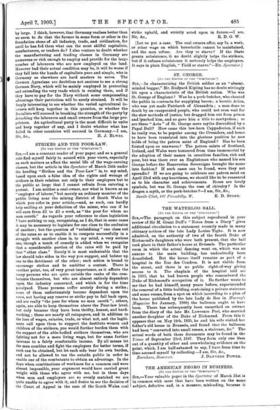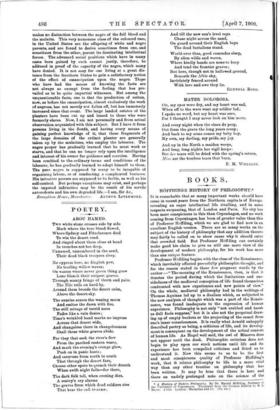THE AMERICAN NEGRO IN BUSINESS.
[To THE EDITOR OF THE "SPECTATOR."] SIR,—Your valuable paper in the Spectator of March 31st is in common with most that have been written on the same subject, defective and, in a measure, misleading, because it
makes no distinction between the negro of the full blood and the mulatto. This very numerous class of the coloured race, in the United States are the offspring of white and negro parents, and are found to derive sometimes from one, and sometimes from the other, parent its dominating intellectual forces. The advanced social positions which have in many cases been gained by such cannot justly, therefore, be adduced in proof of the capacity of the negro, which many have denied. It is not easy for one living at a great dis- tance from the Southern States to gain a satisfactory notion of the effect of emancipation upon the negro. Those who have had the means of knowing the facts are not always so exempt from the feeling that has pre- vailed as to be quite impartial witnesses. But among the unquestionable facts, one is that the production of cotton, now, as before the emancipation, almost exclusively the work of negroes, has not merely not fallen off, but has immensely increased since that event. The large landed estates of the planters have been cut up and leased to those who were formerly slaves. Now, I am not personally and from actual observation acquainted with this subject. But I have it from persona living in the South, and having every means of gaining perfect knowledge of it, that these fragments of the large domains of the extinct planter are generally taken up by the mulattoes, who employ the labourer. The negro proper has gradually learned that he must work or starve, and that he can no longer rely upon the intelligence and interest of his owner for guidance and coercion. Having been remitted to the ordinary terms and conditions of the labourer, he has gradually learned to adapt himself to them. The pure negro is supposed by many to be incapable of organising labour, or of conducting a complicated business. His initiative powers are supposed to be feeble, as well as his self-controL But perhaps exceptions may exist, and perhaps the imputed infirmities may be the result of his servile antecedents and his own degraded life.—I am, Sir &c., Broughton Rouse, Manehestre. ARTHUR LIVERMORE.







































 Previous page
Previous page